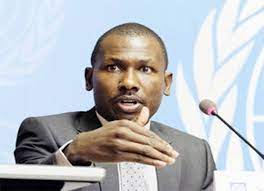News
Over 17,000 Babies Born In 18 Borno IDP Camps, IOM Confirms

The International Organisation for Migration (IOM) has said that 17,053 babies were given birth to by Internally Displaced Persons in 18 locations in Borno State alone.
The UN agency told newsmen that the figure represents information of babies who have been registered between 2019 to May, 2021.
The IOM Chief of Mission, Mr Frantz Celestin, said that the agency collaborates with the National Population Commission (NPC) and UNICEF to issue birth certificates to the children.
According to him, the identity of the children was very important and also falls within its Displacement Matrix data which it shares with other stakeholders intervening in the North-East.
“We do biometric data collection so that we know exactly the number of people who have been displaced so that the service we provide to them can be effective.
“This is important for food distribution, for non-food items distribution, it is also important for medical provision.
“Some of the work that we do on our displacement matrix data is to work with the population commission and UNICEF to provide birth certificates to those under five who were born in the camps.
“On the number of children that were born in the camps, I know last time I checked, those who had taken the biometrics and issued birth certificates between 2019 and May, 2021 were 17,053,” he said.
The IOM’s chief said the data helps it to identify those who have been displaced, adding that “if you don’t have an identity you do not exist in the eyes of the government and the law”.
He said that it was important for the IOM that in spite of the conditions that they find themselves in, the children were identified.
Celestin, however, said that it was unfortunate that many people in Nigeria only identified the IOM with the retuning of migrants, pointing out that the work of IOM goes way beyond that.
“In Nigeria, IOM is celebrating its 20th anniversary. But there are a lot of people who don’t know the extent of IOM’s presence in Nigeria, they see IOM as managing migration or just bringing people back from Libya. But there is a lot more to what we do.
“We are the biggest shelter providers in the North-East, the biggest camp managers – managing 115 camps.
“Also, we have 19 mobile teams looking after the mental health of those who have been traumatised by Boko Haram.
“We have migration data collection and management, and this is where most people have come across our data and they don’t know that it is Nigerian Data.
“If you hear that 2.1million people have been displaced in the North-East, that is our data.
“The displacement tracking matrix collects these data, provide it to the humanitarian community so that they can do targeted and specific interventions,” he said.
News
HoS Hails Fubara Over Provision of Accommodation for Permanent Secretaries

News
Allegation of Disrespect to President Tinubu Unfounded — Rivers Government

News
Rivers Government Dismisses Allegations of Disrespect to President Tinubu

-

 Politics4 days ago
Politics4 days agoPFN Rejects Call For INEC Chairman’s Removal Over Genocide Comments
-

 Rivers4 days ago
Rivers4 days agoFasthire, PHCCIMA, CIPM Host CareerFest 2026 In PH
-

 Sports4 days ago
Sports4 days agoEnekwechi wins Orlen Cup in season opener
-

 Politics4 days ago
Politics4 days agoHoodlums Disrupt LP-ADC Defection Event In Lagos
-

 Sports4 days ago
Sports4 days agoFalconets, Senegalese Lionesses arrive Ibadan for qualifier
-

 Sports4 days ago
Sports4 days agoSimba open Nwabali talks
-

 Politics4 days ago
Politics4 days agoRemoval From INEC’s Portal, Abure-Led LP Faction Mulls Legal Action
-

 Niger Delta4 days ago
Niger Delta4 days agoTinubu, Jonathan, Diri Pay Last Respect To Ewhrudjakpo

